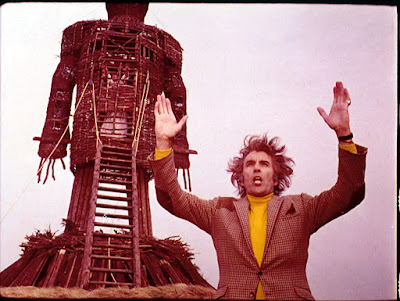Small Town Values - Friday Video Distractions with Mike Norton
Alternate title: The How Quaint Horrors.
There's a sub-genre of mystery films that has to deal with small towns and isolated communities with a Big Secret. A mission, a way of life, a smiling, all-sacrificing commitment to The Greater Good. This week I'll tap several of them, though I'm not pretending fora moment this is an exhaustive list. These are just instances I've seen and remember.
There's a sub-genre of mystery films that has to deal with small towns and isolated communities with a Big Secret. A mission, a way of life, a smiling, all-sacrificing commitment to The Greater Good. This week I'll tap several of them, though I'm not pretending fora moment this is an exhaustive list. These are just instances I've seen and remember.
The usual approach is to have a main character - our surrogate - coming
to some remote village, often on some professional mission. There he
encounters a long-isolated society, which is initially quaint, even
seemingly happy, but as time passes odd and worrying elements become
apparent. Ultimately, the question of whether or not the newcomer will
be able to leave usually becomes the main issue. Along the way, with the
revelations about each community's beliefs and their shared secret, the
viewer is challenged to at least consider the value of the trade-offs
being made, and how well or not their system has served them.
Twice, in 1973 (the lauded version) and for a generally disparaged remake in 2006, the big screen saw versions of The Wicker Man.
Twice, in 1973 (the lauded version) and for a generally disparaged remake in 2006, the big screen saw versions of The Wicker Man.
Starring Edward Woodward, Britt Ekland and Christopher Lee, it's a film with some impact. As with all but one on this list, though, it's not an upbeat time.
The 2006, Americanized, Nic Cage vehicle version was primarily a remake of the earlier film, that did try, at least a little, to look back to the 1967 novel for an item or two. Financially, both films did poorly, costing more to make than they took in at the box office.
In 1978 NBC ran a 2-part miniseries called The Dark Secret of Harvest Home.
A core selling point was that they could brag that the lead was
long-time (mostly long ago, even at that point) star of screen Bette
Davis.
The full version, a little over 3 hours 48 minutes, is available
in a less than sharp but otherwise watchable copy over on YouTube. (This
is the full version link, rather than just a trailer --- which can be
found over on YouTube, too.)Harvest Home shares the agrarian society underpinnings of Wicker Man, as the lives and rituals of the locals are tied to the success of their crops, and the harvest is central to the community's survival. Unlike the earlier film, our surrogate is the fatherly head of household, as he and his family have moved to the new community. This brings with it an array of plot possibilities, as it's not a lone outsider against growing suspicions, but someone who also is concerned about his family's well-being. This plays heavily in the ending.
The rare action comedy twist on the genre came our way in Edgar Wright's 2007 Hot Fuzz (R, 121 minutes), starring Simon Pegg (who co-wrote) and Nick Frost. This is the second entry in the "Three Flavours Cornetto trilogy" collaboration between Wright, Pegg, Frost and producer Nira Park, though there are no direct character or story/continuity connections between the films.
The story, pace
and
characters all work very well for me here, as a hyper-achieving big city
cop is shuffled off to the seemingly bucolic dullness of a picturesque
village in the English countryside as a consensus move by colleagues and
superiors who are all tired of him making them look bad. Great fun, and
the only really easy revisit for me on this list. I've lost track of
how many times I've watched it on a whim. Come to think of it, aside
from the very last film I'll have mentioned here today, it was the only
box office
success, taking in at least five times what it cost to make.
Steve Kady (Jeremy Sisto), a Chicago-based census worker, is dispatched to the remote town of Rockwell Falls. He's there to do a detailed check when records show that every census has reported the town had exactly 436 people.
Nearby locals won't
even speak to him when he mentions where he's headed. An initial "not
welcome" message does a hard 180 once they know he's duty-bound to
visit, and his work will take more than a day.
Word travels quickly, so everyone he meets already knows who he is, and
the welcome wagon comes on strong. The creepiness is never far away,
though, and it intensifies as Kady sees the signs of strain on some of
the happy, happy masks. The town's secret has an iron-clad circular
reasoning to it.
There'll come a point where you'll either shut it off (though by that
point you'll likely decide to see it through the final 15 minutes or so)
or you'll give in to yelling at the screen like a mental patient for
Steve to Just Leave Town!
The fixed population aspect gives this film its own, unique mechanic,
which helps keep it from feeling completely like a retread. That becomes
key in the ending.
Oh, and no, I haven't yet made the time to watch Midsommar (2019, R, 148 min.), though it obviously fits in this genre.
Oh, and no, I haven't yet made the time to watch Midsommar (2019, R, 148 min.), though it obviously fits in this genre.
Perhaps the most timely thing about these films is that their message is to not travel and meet new people.
Enjoy your weekend! - Mike

Comments
Post a Comment